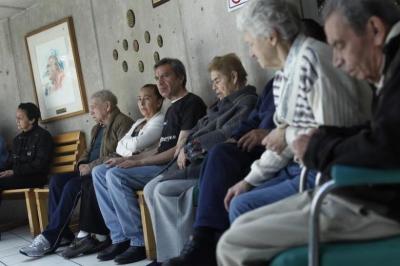Would the Church love me if I had dementia?

I sat on the park bench watching the little boy play with trucks in the sand. A tiny city of hills, holes and roads. Lost in a world of play, he laughed, making motor sounds as he pushed his trucks in delight. Mom approached to announce it was time to leave, packing up the trucks and wrestling with her son to sit in his stroller. Meltdown! A crying tantrum and battle of wills, the mother struggled with the little boy whose play world was dismantled.
That day at the park I was deep in thought, reflecting on one of my patients diagnosed with early-onset dementia. He is in his early fifties, married and has teenage children. A beautiful Christian family on the front end of a difficult journey.
Having worked with many patients and families with dementia, I knew what lay ahead. As I watched the little boy's imaginary city dismantled, I wondered how I would handle a diagnosis of dementia, knowing little by little, my world would be taken apart.
Our greatest fear of dementia is losing ourselves because the memories that connect us are forgotten. As memory dwindles, there is a fear of fading away from family and friends, losing all connection to self and others. The question seems inevitable, “Who will I be when finally alone?”
It is the disconnectedness that unravels life, the stark opposite of love and connection. Life is relational, the people we love and the relationships we share. Loving our family and friends is the life we know on earth. It is our greatest joy, our glue for belonging and significance. If we lost all connection to each other, there would be no life — it would contradict the thing we call "life."
Understanding those fears, I encourage Christians facing dementia to focus on the body that remains unscathed. The parts of the body that remain healthy, sustaining and giving life to what is taken away. The body Christ called his Church.
We are not held together by neurons and the brain, but by the body of Christ, through whom all things are held together. (Colossians 1:17) We may lose the function of memory but are still held together and built up in Christ. Concretely, this happens in the Church, the body of Christ. The apostle Paul beautifully describes how the Church functions to keep us together when dementia, or any illness, dismantles our lives
The body (church) is not one member, but many. If the foot says, “Because I am not a hand, I am not a part of the body,” it is not for this reason any the less a part of the body. And if the ear says, “Because I am not an eye, I am not a part of the body,” it is not for this reason any the less a part of the body …. On the contrary, it is much truer that the members of the body which seem to be weaker are necessary …. And if one member suffers, all the members suffer with it; if one member is honored, all the members rejoice with it. (1 Corinthians 12:14-26)
If dementia is in my future and I can’t read my Bible, I hope you will read for me. If I forget how to sing, that you will be my voice and croon old gospel hymns while I sit alone in my chair. That you will remind me of things I have forgotten with stories and pictures of the past. That you will be my legs, feet and arms to go to the store, take me to my doctors’ appointments or just remind me where the bathroom is. And if I appear to have lost myself, I pray that you will be found next to me.
It is the message and hope that Jesus revealed to the world — love and union with God our Father and one another. The craving of our hearts to belong, be remembered and connected for eternity, not only with God, but our loved ones; never lost in memories (like dementia) or in death when life on earth is gone.
We are all beautifully woven together in one body, the Church with Christ as our head. And we are “convinced that neither death, nor life, nor angels, nor principalities, nor things present, nor things to come, nor powers, nor height, nor depth, nor any other created thing, will be able to separate us from the love of God, which is in Christ Jesus our Lord.” (Romans 8:38)
As I sat on the park bench, watching the little boy, my attention shifted to the loving mother who held him in her arms. She playfully made faces, twirled her son around in her arms, until a smile and giggle came to his face. He had lost his tiny world of sandcastles, but the love and relationship with his mom held him tight.
If one day I do have dementia I pray the Church will become my feet, legs and hands. That she will twirl me in her arms with the love of Jesus, comforting me in a world of castles held together by sand.
Dr. David Zuccolotto is a former pastor and clinical psychologist. For 35 years he has worked for hospitals, addiction treatment centers, outpatient clinics and private practice. He is the author of The Love of God: A 70 Day Journey of Forgiveness.




















